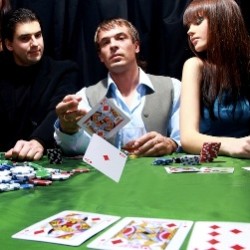What Scientists Discovered From Delving Into The Psychology Of Poker?

This article is based upon research conducted by Dr. Jaclynn Moskow, which seeks to provide a detailed look at the psychology behind poker, and what scientists have discovered from studying this fascinating game of incomplete information.
What Has Studying Poker Players Revealed?
Poker games are very intense and most of the time they require the players to think in a probabilistic manner, as this allows them to defeat their opponents. During a poker game, people need to maintain a sense of self awareness, but at the same time they also need to out-level their opponents, avoiding tilting and always adjusting their play in order to gain the upper hand. Simply put, playing poker is very demanding for the human brain, and studies have show that the game requires a complex decision making process, making poker players a great base to study how the human brain works. Maybe the best part about the whole endeavor, however, is that the players themselves can actually learn from the study, which is rather neat.
Tight Aggressive Style Correct
A PhD student at Cornell University studied the data that came from around 27 million hands of no-limit holdem. The interesting thing here is that players who move up in stakes become more and more aggressive. The aggressive players thus become the biggest winners in the whole endeavor, and the loose passive players are actually the biggest losers, since they usually win less BB/100 hands. However, not all of aggressive players are winners, as there are people who have this play style but fail mainly because they cannot implement it properly all the time. According to the author of this study, it’s very hard to find a tradeoff limit for restraint and aggression, and usually people choose to go either one way or the other.
Tilt Worsened By Being Watched
A 2014 study from Finland created specifically on the topic of tilt asked poker players to read a certain set of stories, and pretend that they were the story’s narrator. Whilst reading, they had to create scenarios and then see how the others would react to them. There were multiple topics to read about, such as infidelity for example, but the results here are more than conclusive that experienced poker players perception of a social presence did not affect their decision making. This basically shows that the experienced players have a lot more confidence in their powers.
Better Self-Analysis From Experienced Players
Another study created by the same Finnish group just mentioned required poker players from the online world to calculate their own EV in a variety of poker scenarios, as this allowed them to create situations that were based on these calculations. The results showed that experienced poker players had self-reflection, whereas the others had a self-rumination which basically means that they dwelt on negative experiences. Self reflection is something that occurred very often as far as experienced players were concerned, something that shows that mature players have the power to analyze their losses and learn from them.
Poker Players Skilled In Probability Judgments
The University of Essex also conducted research based on the power that poker players have. They had to play with different card variations, and their results were compared with a computer program that did literally the same thing. The players with a lot of experience actually managed to estimate their hand strength quite better, even though in some situations they would think that their hands were a lot stronger than they actually were. Further research took place at the Limerick Kemmy business school, focusing specifically on studying content, including that from posters on online poker forums, which many thought of as being a waste of time.
Conclusion
These studies are just the tip of the iceberg, and we can rest assured that there are a lot more on their way, because people are genuinely interested in poker and the way it affects the human mind. The main idea is that avid poker players are indeed showing an increase in brain activity and other positive side effects, which showcases the great benefits poker offers those people playing it!










